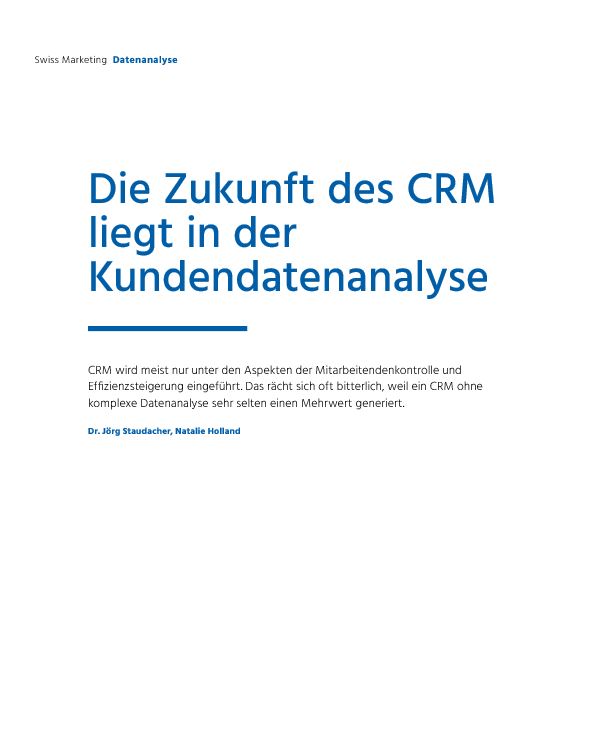Best CRM System
We are always asked, what is the best CRM system? There are now over 400 CRM systems on the market. Which does not simplify a selection. We spent over 40 hours and took a closer look at 50 CRM and marketing automation systems. There is no such thing as the best CRM; it always depends on the requirements. The following is intended to shed more light on a dark chapter.
The first step is to check which basic requirements a company has for a CRM system. That sounds logical at first. We experience in more than 95% of companies that before selecting a CRM system, there is no exact business case on how a CRM system will increase profit and/or growth. There is a persistent idea that a CRM system increases customer loyalty and thus profit increases almost automatically. In this context, the great strength of customer relationship management lies in cross-selling. However, this places enormous demands on the strategic level, on data acquisition and on implementation by the sales team or at the various touchpoints. For our assessment of Best CRM, the focus is on cross-selling.
In addition, it must be clarified whether a company needs a classic CRM system and/or a marketing automation system. A CRM system is primarily intended as a controlling tool for sales staff. “Deals” are created and reviewed to see how they develop over time. The control of sales activities is also possible with such a system. The system is primarily used by the management to get an up-to-date overview of the order situation and the pipeline as well as the activities of the sales department. In addition, some systems support zoning and route planning. At the individual level, all emails and calls with customers are synchronized or recorded, if possible. Employees can enter tasks and notes in the CRM system. Thus, a CRM system is fundamentally a database with strong controlling or reporting functions.
Marketing automation systems put customers at the center. Customers are communicated with via emails, SMS, chat bots and other digital channels. The focus is not on the employees, but on the customers and their reactions to the various activities. Many marketing automation systems now have basic CRM functionality built in. So deals can also be created, emails can be synchronized, notes and tasks can be created for the contact. Specific B2B sales support functions, such as. However, route planning, territory planning, automatic telephone log or comprehensive reporting on sales activities are not possible.
In addition to system selection, there is another point to consider. Existing systems are hardly capable of converting customer data into valuable customer insights. Therefore, it is often necessary to establish middleware between the CRM and ERP systems to further process the existing data. Customer scoring or a more complex customer value calculation are not supported by the systems. In most cases, customers are managed via a points system in the individual systems. But with 5 points to give most of the time, you quickly run out of points. Also, this classification is very unspecific and hardly relevant for control in the case of a larger customer base. Thus, the data intelligence of most systems is manageable and offers only limited added value for an individualized customer approach. It should be developed, before the acquisition of a CRM system, the data structure and especially a concept for gaining customer insights for a differentiating customer relationship management, before a software is purchased. This is especially true for the topic of cross-selling. This requires customer insights to uncover cross-selling potential and leverage it for sales/marketing. The larger vendors are touting AI capabilities. In our tests, the artificial and not the intelligence is currently still predominant.
It is therefore necessary for a company to decide which goals are to be achieved. As described, most companies lack a clear strategy in terms of customer relationship management with a target system and a concept of how to gain and use valuable customer insights. Nevertheless, “wild” decisions are made on the basis of bogus criteria as to what is the best system.
We divide the selection for the Best CRM into two categories. Extensive skills and resources and low skills and resources. For us, it is not the size of the company/industry that is decisive, but the number of employees and their competencies that can be used for the topic of CRM.
Best CRM system with extensive skills and resources
Salesforce CRM
Salesforce has been very successful in recent years. For companies with extensive competencies and resources, the CRM system is almost without alternative for sales management. In addition to a high price and hidden additional module prices, the software offers a modular structure that allows flexible adaptation to the respective company. The handling of the application is rather challenging for the employees but good against the background of the functional scope and the degrees of freedom. Many companies are adopting Salesforce CRM when in fact the market intelligence capabilities would be much more important. Here it is important to critically examine whether Salesforce is the right choice.
Salesforce Pardot
Pardot is Salesforce’s B2B marketing automation that must be additionally purchased and implemented. Here, Pardot addresses the lead control in the funnel. Only a small amount of data is exchanged between the CRM and Pardot. This extremely limits segmentation and cross-selling ideas. Landinpages and comprehensive automations are not available here. The goal is to lead the individual prospect to close with specific activities as part of the sales interactions. Thus, Pardot is more of a leadnurtering system than an automation system.
Salesforce Marketing Hub
Salesforce offers a “classic” marketing automation application in addition to Pardot. However, this is limited. Forms cannot be created with it. Web tracking is performed in a delayed manner via the CRM module. You will also look in vain for social media in this application. Marketing Hub is not recommended against the background of the price and the range of functions. The integration of numerous other modules from the Salesforce world makes the data structure and the application unnecessarily complicated and expensive.
Conclusion Salesforce
Salesforce’s CRM system is one of the best applications. For classic B2B sales, this application is absolutely recommended. But Salesforce’s marketing automation applications are not up to snuff. However, Salesforce CRM can be connected to many marketing automation systems. Salesforce is therefore only recommended to companies that want to use a “classic” CRM system in terms of sales management and do not shy away from the complexity of using another automation application.
Microsoft Dynamics 365 Sales
Microsoft also divides CRM and marketing automation. We rate the CRM system as somewhat more difficult to use than Salesforce. However, the applications hardly differ in principle. Microsoft also offers a valuable LinkedIn connection that can be very valuable for B2B sales.
Microsoft Dynamics 365 Marketing
Compared to Salesforce, Microsoft’s marketing automation does much better. Forms, social media and web tracking are available. The basic structure is also much clearer. The application has weaknesses in the more complicated configuration.
Conclusion Microsoft
Compared to Salesforce, the combination of CRM and marketing automation system from Microsoft convinces us much better. Microsoft now also offers additional modules and applications, particularly in the field of AI. If a company does not want to make any major compromises in B2B sales, but also in marketing automation, and wants to get everything from a single source, Microsoft is currently our recommendation.
Marketo (Adobe)
Marketo (never heard of it) has a problem that system has not made it into the top-of-mind in many companies. In doing so, Marketo is the leading marketing automation application at a price. For companies that do not have B2B sales (e.g. e-commerce) or companies with Salesforce CRM, but who also want to play in the first league in marketing automation, Marekto is the first choice. At the same time, the application convinces with a comprehensive reporting system that other marketing automation systems lack. There is also the possibility to connect Marketo to a small CRM system, e.g. Sugar CRM, whose functions are quite sufficient for many companies. For marketing automation professionals, Marketo is our #1 choice.
Hubspot
Comparable to Salesforce CRM, Hubspot has taken a prominent position among marketing automation applications in recent years. In this context, it is also important to discover hidden cost-relevant additional modules at an early stage. The application offers the widest range of functions (a basic CRM system is also included). However, this becomes the application’s downfall more and more over time. Users complain that the range of functions in the individual areas is increasingly falling behind specialized applications. Whether SEO should really be integrated in a marketing automation application is not answered here. Also, the ability to create mail merge letters would still be helpful. The advantage of Hubspot is that a basic CRM is included, so employees only need to work in one application. For companies that are focused on basic marketing automation, need a basic CRM system, and only want to “expose” one application to employees, Hubspot is the first choice.
Sharp Spring
Similar to Marketo, Sharp Spring ekes out a shadowy existence. The application justifies the higher price point with behavior-based web tracking, which can be very interesting especially in e-commerce and for companies with a large number of visitors on the website. In addition, reporting also provides in-depth insights that no one provides except Marketo. The integrated two-way connection to CRM systems, such as Salesforce, Zoho and Sugar makes the application very interesting for analytics professionals. Whether landing pages and blogs are the core of marketing automation remains questionable. The segmentation functions make this application very interesting. Thus, a certain exotic, but worth a closer look. However, this means that there is a concept on the topic of target system and customer data strategy around the company.
Best CRM system for few skills and resources
Freshworks
Freshworks is an application that is also modular. There is a CRM, automation and service system. At the same time, the applications offer a very appealing interface. The price combined with an appealing user interface make the application interesting. In terms of the range of functions, the application cannot stand out from the competitors. The application is worthwhile for companies that are looking for a basic application from a single source and do not have too high expectations for a CRM/automation system.
Insightly
Insigthly follows the trend from the CRM system to the combination with a marketing automation application. The applications convince with an appealing interface and a focused range of functions. We are critical of the price for the marketing automation application and the additional price for the connection to other systems. Automation offers only the basic functions and a strong focus on data management. We appreciate the “simple” CRM system, we see the combination critically.
Zoho CRM
Zoho CRM actually leaves nothing to be desired. Everything is possible that is also possible in Salesforce and Microsoft. Above all, the comprehensive reporting system brings tears of joy to the eyes of every controller. However, it is noticeable that the application belongs to the older systems. Usability and the look & feel fall somewhat by the wayside. Also, support is only available in English and usually after multiple requests, although the employees make an effort. The freedoms that Zoho offers, compared to the price, make the application one of the best CRM systems. The Zoho Plus version with a campaign and service support tool is also interesting.
Zoho Marketing Automation
Salesforce seems to have borrowed a lot from Zoho. Zoho is also modular in this way. There is a campaign application and marketing automation application. But only one of them can be connected to Zoho CRM at a time. This is somewhat confusing. Similar to Salesforce, Zoho’s marketing automation application is significantly weaker than comparable competitors. Thus, only Facebook and Twitter are supported in the social media area. Pop-up forms are not really responsive. The email generator is also much more limited. Since the applications suffers from the unwarranted stigma of not being developed in Europe/USA, the application pays very close attention to privacy, which unnecessarily limits its handling. Since the servers are located in the EU, these restrictions would not be necessary at all.
Conclusion Zoho
Similar to Salesforce, Zoho CRM is convincing. Marketing Automation is more powerful than the Salesforce application, but it is also one of the weaker applications. Thus, there is no individual web tracking and the web visit data is not synchronized between the two applications. For companies that need a powerful CRM system and want to use basic marketing automation features, the ideal applications.
Active Campaign provides powerful marketing automation with a basic CRM system. The price point is very attractive. While Hubspot “drifts” into numerous features, Active Campaign’s feature set is somehow just right or very limited. There aren’t too many options but the ones that are available don’t leave much to be desired. This leads to a very high usability. Somewhat exhausting in handling is that several settings are hidden. Also, emails can only be synced with contacts that have a deal. File upload is not possible. Our experience has been that this simple system adds value to companies very quickly and that the focus is on the customer rather than on years of implementation. For us, best CRM if there is not a large sales force.
Conclusion best CRM
There are now over 400 CRM/marketing automation systems on the market. This makes it increasingly difficult to keep track. Ultimately, however, most systems offer only a limited range of functions or are hardly developed further, which also makes it easier to determine the best CRM. In addition, the price points of many systems, especially from Europe, are very idiosyncratic. In general, there is great dynamism in this software category. More and more new functions make the evaluation challenging. Ultimately, there is no system in which a company does not have to compromise in certain areas. Finally, it is worth remembering that 75% of all CRM projects fail and this is usually for two reasons:
- The system does not provide added value for the company/employees
- Employees maintain the data inadequately because they cannot see any added value.
The creation of a customer relationship strategy and a target system with a business case are therefore the key success factors. System follows goals and customer insights generation!
Our offer in the field of CRM consulting
As an independent CRM consultancy, we support you in developing the optimal CRM strategy. We take a close look at your processes for customer data acquisition and use, as well as your marketing, sales and service activities. The goal is to increase your efficiency in customer relationship management. This is supported by the use of as many automations as possible. In addition, we optimize your growth strategy together with you. This is against the background of improving customer acquisition and retention, so that not only the efficiency but also the effectiveness of your activities is improved.
More article on the topic
CRM is usually introduced only under the aspects of employee control and efficiency increase. This often takes bitter revenge, because a CRM without complex data analysis very rarely generates added value.






